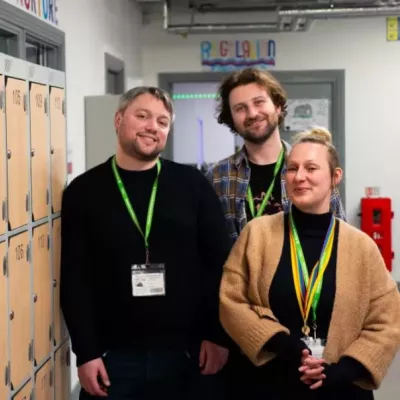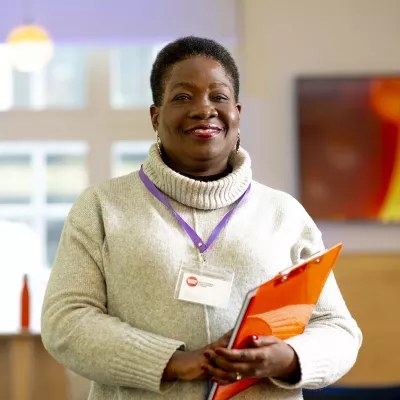We’re launching a new, proactive homelessness prevention programme to help break the cycle of homelessness for the next generation of young people.
The Upstream England programme will focus on young people who are at risk of homelessness in the future, to give them support before they fall through the cracks.
How does the prevention programme work?
Upstream England aims to be rolled out across secondary schools, starting with pilots in Manchester and London.
First, pupils aged 11-16 will take a survey that will help to identify any risk factors they may have.
Some of these risk factors will be clear: they may already be sleeping away from home regularly, showing signs of being disengaged with school, or attending less often. However, the survey is also designed to help spot young people who are at risk but may be more hidden – they may be coping quietly in their own way, but when these topics are explored it becomes clear they’re quite vulnerable.
If a young person is at risk, they’ll be invited to take part in group workshops at school that will help the pilot leaders to dig deeper, figure out if they have urgent or longer term needs to be addressed, and determine a referral route to support.
The programme will connect schools with other local services and support organisations, and together they’ll be able to offer support such as family mediation and holistic health and therapeutic support – all following our psychologically informed model.
The Upstream programme is inspired by proven models from around the world, such as Upstream Cymru, but this is the first time it’s being run and tested in England.
What makes this programme different to our current work?
Distinct to our other prevention efforts, like our national Helpline, and outreach work in Manchester, which support 16-25 year olds immediately at risk of homelessness, this programme is designed for younger people – 11-16 year olds who are still in school – to get to the root of the causes that lead to homelessness before they become a bigger, more challenging problem to tackle. This is a key part of our work to end youth homelessness by 2037.
“If we can intervene early, we can do the really necessary work before any of the damage of being homeless is done. A lot of these children that we're working with might not experience homelessness for years to come. But the earlier we can get there, the more of an impact that we can really have later down the line.”
- Archie, Upstream Project Coordinator
How will we know the programme is working?
This work is a long term project - young people will hopefully be helped long before they reach the point where they would otherwise need homelessness support, so we’ll need to follow up on the outcome of this work in years to come.
However, even in the short term, the Upstream programme will have clear benefits for young people. The survey identifies issues like struggling with resilience, school disengagement, and low wellbeing, and offers interventions to support with these issues - and so improvements in these areas can be recognised and measured very early on.
“One of the key things that we've noticed is that students are thinking a little bit more about what they want to do in the future. So the career path is becoming a little bit more defined for some students who perhaps haven't had role models in their life so far. And so therefore, they're thinking: what do I need to do in the future? Why am I exams important? Why is attendance important?“
- Janine, Vice Principal and Safeguarding Lead at Manchester Enterprise Academy
How can partners get involved?
Partners can get in touch using the Upstream Email – Upstream@Centrepoint.org. We are interested in working with local and national partners to be able to bring this into areas that Centrepoint do not have a footprint, and supporting organisations to be able to deliver it themselves.


